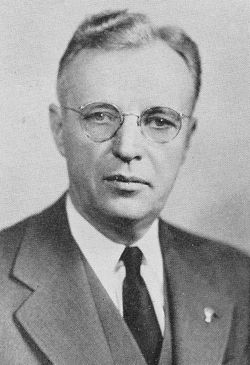
1942 was a good year for the Republican Party, including in Indiana. With this election, Indiana’s delegation in the House went from 7-4 Republican to 9-2 Republican. One of the victors was Charles La Follette (1898-1974), who defeated Democrat John W. Boehne for reelection. However, much to the chagrin of the party, La Follette would prove in the coming years to be to Boehne’s left. Although sometimes voting for the GOP position on price control amendments in the 78th Congress as well as against funds for the National Youth Administration on July 1st, 1943, he often voted for New Deal measures and would only grow more liberal over time.
La Follette’s record, true to his family reputation, was consistently favorable to organized labor, voting against a bill making extortion and robbery in interstate commerce illegal in 1943 (this measure was seen as directed at organized labor), Smith-Connally Labor Disputes Act in 1943, and the Case Labor Bill in 1946. He was also a critic of the House Committee on Un-American Activities, and in one of his first votes he voted against its continuation. In the 78th Congress, his MC-Index score was 48%. On June 22, 1944, he was the only Republican representative to vote against a bill leaving insurance regulation to the states. By 1946, La Follette’s record had become nearly 100% liberal, with his MC-Index score at a 10% for the 79th Congress and none of his votes for conservative positions occurring the second session. La Follette voted for $400 million in housing subsidies and against Rep. Jesse Wolcott’s (R-Mich.) 1946 amendment to end price controls on March 31, 1947. His DW-Nominate score was a -0.125, which makes him one of the most liberal Republicans to ever serve by that standard. Perhaps the Republicans should have known better about him, as his third cousins were Senator Robert La Follette Jr. (Prog.-Wis.) and Governor Philip La Follette, both liberals.
In 1946, he announced his run in the Republican primary against conservative Senator Raymond Willis. One report on him noted, “Lawyer La Follette has startled his G.O.P. colleagues by voting for New Deal measures, dismayed them by lectures on the evils of states’ rights” (TIME). However, Willis withdrew from renomination and conservative hardliner William Jenner ran instead. The Republican Party in 1946 in Indiana, like in Wisconsin in which Joseph McCarthy defeated Robert La Follette Jr., had no appetite for a La Follette and Jenner won the primary with 95% of the vote.
Afterwards La Follette played a major role in the Nazi Judges’ Trial at Nuremberg, serving as deputy chief counsel to prosecutor Telford Taylor and crafted the case against them. He would also be part of the founding of the liberal lobbying group Americans for Democratic Action and even serve as a director from 1949 to 1950. Interestingly, he called for former Secretary of State James F. Byrnes to form “something like ADA” for conservatives nationwide (The New York Times). Conservatives would commonly use reverse ADA and the AFL-CIO’s COPE (Committee on Political Education) ratings to determine legislator conservatism until the foundation of Americans for Constitutional Action in response to the 1958 midterms.
References
Conference Report on H.R. 2935, Dept. of Labor, Federal Security Appropriations, to recede and concur with a Senate amendment appropriating $45 million for the National Youth Administration, and allowing all youths between ages of 16 and 25 to participate in N.Y.A., rather than limiting the program to “needy” youth. Govtrack.
Retrieved from
https://www.govtrack.us/congress/votes/78-1943/h68
HR 4761 [Housing subsidies – $400 million]. Amend the National Housing Act by adding a new title relating to the prevention of speculation and excessive profits in the sale of housing, and insure the availability of real estate for housing purposes at fair and reasonable prices. Spence motion to instruct the House managers to agree to section 10(A) of the Senate amend. with the following amend. strike out $600,000,000 and insert $400,000,000. Govtrack.
Retrieved from
https://www.govtrack.us/congress/votes/79-1946/h154
HR 4908 [The “Case Bill”]. Provide for the appointment of fact-finding boards to investigate labor disputes seriously affecting the national public interest. On passage, the objections of the pres. to the contrary notwithstanding. (Failed). Govtrack.
Retrieved from
https://www.govtrack.us/congress/votes/79-1946/h174
HR 6042 [Wolcott Amendment]. Amend the Emergency Price Control Act of 1942, as amended, and the Stabilization Act of 1942, as amended. On Spence amendments. Govtrack.
Retrieved from
https://www.govtrack.us/congress/votes/79-1946/h141
La Follette of A.D.A. Bids Byrnes Form a Similar Organization of Conservatives. (1949, December 7). The New York Times.
Retrieved from
National Affairs: Radical & Dominant? (1946, January 14). TIME Magazine.
Retrieved from
To override veto of S. 796 [Smith-Connally], a bill concerning the use and operation of war plants for the prosecution of the war. Govtrack.
Retrieved from
https://www.govtrack.us/congress/votes/78-1943/h62
To pass H.Res.65, authorizing the continuation of the Special Committee to Investigate Un-American Activities. Govtrack.
Retrieved from
https://www.govtrack.us/congress/votes/78-1943/h4
To Recommit H.Res.422 [it was actually a vote on passage], Affirming the Intent of Congress That Regulation of Insurance Business Stay Under State Control. Govtrack.
Retrieved from